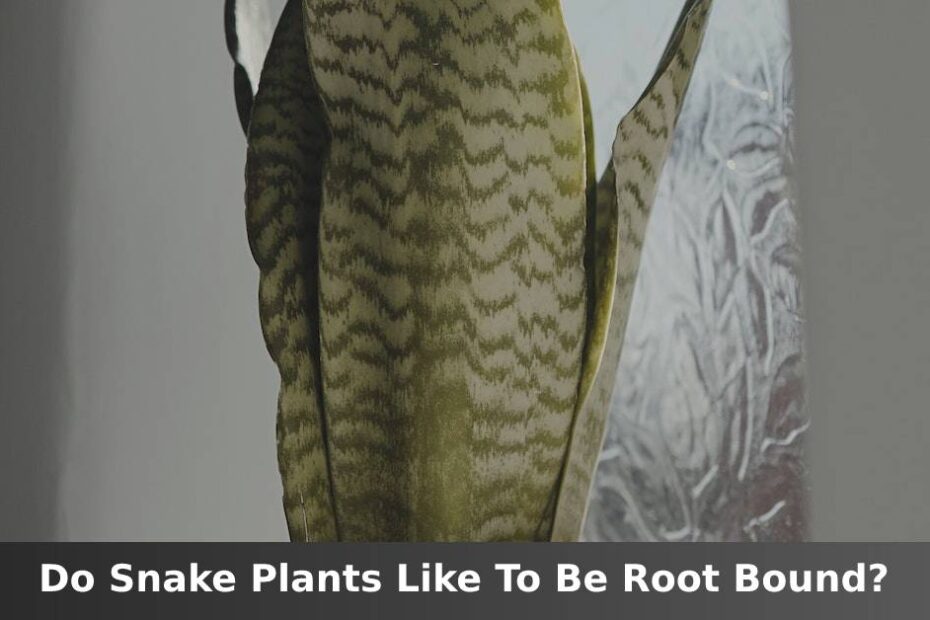Snake plants aren’t very picky about a lot of things which makes them ideal to grow and care for, especially if you’re new to all of this.
So if you’re asking yourself, do Snake plants like to be root bound? The answer is yes, but it depends how root bound it actually is since severe root bound can cause all sorts of issues.
Here’s what to know about this phenomenon.
What does root bound mean?
When a plant is root bound, this means that the plant has outgrown it’s container or whatever it’s currently growing in and the roots become compacted.
This means the root ball will form so large that it ends up taking up nearly the entire container, leaving very little room for the soil and water to be absorbed.
Since the roots become tangled, they will be restricted and not perform their proper duties like they normally would which means nutrients won’t be passed and water will be hard to absorb.
The roots will then try to branch out by any means necessary whether it’s through the drainage holes, the top of the soil or just force themselves out which can break your container if it’s too small.
When a Snake plant becomes severely root bound and you notice any of those signs, it’s time to perform a repot.
If you want to learn how, check out my article on how to repot a Snake plant for a detailed guide.
Do Snake plants mind being root bound?
For the most part Snake plants don’t mind being slightly root bound, in fact they actually prefer to be a bit pot bound and have a container that fits well.
It makes it all that much easier for the plant to get proper amounts of water and nutrients without the roots having to branch too far out and since Sansevieria have shallow roots, this can almost be ideal.
Plus you don’t want a container that’s too large as it can make overwatering and root rot all the more likely to occur since the soil won’t drain as fast as it should.
The problem comes when your Snake plant becomes severely root bound which is not good for the plants growth or health.
Problems from severe root bound Snake plants
Although Snake plants like to be slightly root bound, they do not like to be severely root bound and a number of issues can arise such as the following.
Yellow leaves
Your Snake plant can turn yellow for a number of reasons one of which is the roots being bound to the container.
This is because when it’s root bound, your Snake plant won’t be able to intake water or nutrients as effectively as it would under normal circumstances and this results in loss of color or yellowing.
Brown leaf tips
Similar to how lack of water and nutrients being provided can cause yellow leaves, this can also cause your Snake plant to develop brown leaf tips.
Curling leaves
Whenever a Snake plant is struggling to retain moisture, the plant has a tendency to curl it’s leaves inwards to try and retain any moisture it can. When the plant is root bound, it has a hard time passing water from the roots to the leaves so this can happen.
Drooping leaves
Another leaf symptom you may notice is drooping leaves which means they are starting to fall over or bend downwards.
Although this is often a sign of underwatering or overwatering, a root bound Snake plant can also produce this symptom since the roots will have a hard time carrying out their job.
Stunted growth
Slowed growth or no more growing all together can certainly be caused by a root bound plant due to the plant not receiving water and nutrients properly.
You get it by now.
Don’t mind me sounding like a broken record.
The container is breaking
With nowhere else to go, the roots can try to branch out and actually break your pot or at the very least cause it to crack a bit.
When this happens it’s essential that you go ahead and repot your Sansevieria since it’s literally at it’s breaking point.
Will a root bound Snake plant recover?
A root bound Snake plant will not recover on it’s own and in fact will get worse if you don’t take any action yourself to give it more space.
If your mother-in-laws-tongue has become severely root bound, the only way for the plant to recover is to give it a good repot into a larger container that can handle the excess growth.
Your Snake plant will very much thank you for doing so by continuing to grow and look great with the new space provided.
Another option you can use is propagating your Snake plant by division which means multiplying the plant from the current one by dividing it into 2 or more parts.
To learn more about propagating, check out my article on how to propagate Snake plants.
Wrapping up
So if you were wondering do Snake plants like to be root bound, now you know that they do, but only slightly.
Overall if your Snake plant is only a little root bound then don’t worry but continue monitoring it and take action when it’s needed.
As always just have fun and enjoy the experience!
